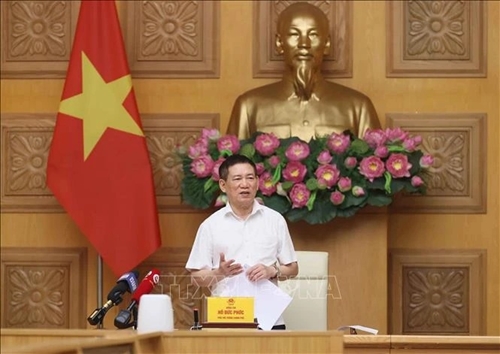Phoc made the call while chairing a meeting on November 15 with working groups No. 4 and No. 7, focused on addressing challenges and expediting public investment disbursement in 2024, with the attendance of representatives from 26 relevant ministries, agencies, and localities.
The Deputy PM underscored that the most critical risks are violations concerning project quantity and quality, which are primary contributors to capital losses.
With only 45 days remaining until the end of 2024, he emphasised that meeting the committed 95% disbursement rate will require extraordinary efforts. He urged swift actions to overcome obstacles, directing ministries and sectors to respond promptly to local needs, ensuring that workloads of the projects are completed by December 31, 2024.
Specifically, he asked the Ministry of Planning and Investment (MoPI) to review provinces' proposals to adjust total investment levels, simplify investment procedures, reallocate resources, address procedural bottlenecks, and allocate additional capital to ensure projects are completed as scheduled and with optimal effectiveness.
    |
 |
|
Deputy PM Ho Duc Phoc speaks at the event |
Meanwhile, the Ministry of Finance was assigned to resolve issues related to official development assistance (ODA) capital, adjust investments, and coordinate resource allocations in alignment with the MoPI's suggestions.
According to the MoPI, the disbursement rate of public investment in the first 10 months of 2024 of 10 central ministries and agencies, and 11 localities reached 58.9% of the target assigned by the Prime Minister, surpassing the national average. Four central agencies and eight localities reported rates above the national average, while five ministries and three localities lagged behind.
The MoPI attributed the slower-than-expected progress to challenges stemming from legal regulations, land clearance, and procedural hurdles in implementing national target programmes.
Pham Duc Toan, Permanent Vice Chairman of the Dien Bien provincial People’s Committee, reported that only 58.4% of its allocated investment had been disbursed as of October. He cited lower-than-expected revenue from land use fees due to broader economic difficulties, adverse weather conditions, and material shortages - particularly in sand supply - as contributing factors. Capacity and management of consulting and project management teams were also a problem.
A representative from Cao Bang province pointed to its 48.1% disbursement rate, primarily due to difficulties in funding for the Dong Dang - Tra Linh expressway project. Prolonged heavy rains and flash floods have slowed the project's progress. The province is accelerating construction during the dry season and is committed to reaching a 95% disbursement rate by year-end, the representative said.
Source: VNA